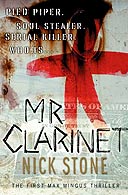| Want to send this page or a link to a
friend? Click on mail at the top of this window. |
| Mr. Clarinet by Nick Stone |
| 576pp |
| £12.99 |
Reading Nick Stone's novel, I kept thinking about the Haitian tourist industry and how
irked it would be by his work. My guess is that the two most-read books on Haiti are CLR
James's The Black Jacobins, detailing Toussaint l'Ouverture's slave revolt and the war of
independence from France in 1803, and Graham Greene's The Comedians, which depicts Papa
Doc's dictatorship. Apart from that, I suspect most of us hear about Haiti (despite it
being the only country I know of that has a Council of Sages) only when it comes top in
some ranking of benightedness. Some countries seem exclusively reserved for misery. (There
is, I discovered on the net, a Haitian tourist ministry, but, appropriately, its website
didn't work.)
Stone's protagonist is Miami private eye Max Mingus, a world-weary ex-cop, ex-con
descendant of Sam Spade, who is invited to take on the job of finding a child, missing
presumed kidnapped in Haiti. "He knew this about Haiti: voodoo, Aids, Papa Doc, Baby
Doc, boat people and recently, an American military invasion called Operation Restore
Democracy he'd seen on TV." The success fee is $10m, and even allowing for the fact
that the missing child's father is a billionaire (the rich in Haiti are very rich), the
size of the reward should have alerted Mingus to the hazards ahead.
Gritty and unremittingly dark, replete with supervillains, Mr Clarinet pays homage to
pulp fiction and film noir - more James Ellroy than Graham Greene. But perhaps because of
Stone's Haitian roots, Mingus's mishaps in Port-au-Prince have an immediacy and an
authenticity that are absent from many thrillers. In one nightmarish scene Mingus
carelessly wanders out of a bar and finds himself lost in a deserted district. A shoeless
street kid appears and asks for money. Mingus refuses, and then notices dozens of other
ragged children emerging out of the darkness. They start collecting sticks and rocks and
Mingus seems to have no choice but to open fire to avoid being lapidated by a mob of
10-year-olds.
Mr Clarinet is a voodoo spirit, reputedly the disembodiment of a French boy soldier
killed during the war of independence, who is considered a sort of Pied Piper involved in
the disappearance of children. It seems nearly impossible to write about Haiti without
mentioning voodoo (or more properly vodou, to distinguish it from the slightly different
New Orleans voodoo). Stone stresses that vodou is a religion, with all the tedious rituals
associated with any religion, and not black magic, but nevertheless Mingus at one point
consults a voyant, a psychic who formerly worked for Papa Doc. The voyant assures Mingus
that the missing boy is alive and well. When pressed by Mingus for some details of the
boy's whereabouts, the voyant testily replies: "You have to find out yourself. That's
why you're here." Mingus does indeed find out, unearthing a grisly clump of
conspiracies. I can't see Disney optioning this novel for a film.
Guardian Unlimited © Guardian Newspapers Limited 2006. Reprinted from Guardian
Unlimited of Saturday, January 21, 2006.
| Wehaitians.com, the scholarly journal of
democracy and human rights |



